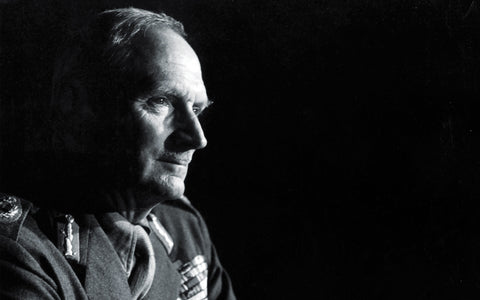
What Historians Get Wrong About Field Marshal Bernard Montgomery
Field Marshal Bernard Law Montgomery is the most maligned general who served in World War II. Historians have labeled him arrogant and insufferable, heaping fuel onto the fire of their scorn by accusing him of military incompetence. A particular phrase attributed to Winston Churchill about him—one that has become trite due to its thoughtless repetition—refers to Montgomery as being “in defeat, unbeatable; in victory, unbearable.” Those cavalier words are often used—unjustly—to sum up Montgomery’s entire legacy.
Recommended for you
Bernard Montgomery was, in fact, a brave and self-sacrificing man who deserves far more respect than most historians seem willing to give him. Montgomery could fairly be described as cocky, but the majority of history’s great battlefield commanders are. It is necessary for a good general to possess a certain combination of boldness, confidence and aggressiveness to be an effective leader in battle. A shrinking violet makes a poor general.
Not a Narcissist
One of the most common charges leveled at Montgomery is that he was a narcissist. He was definitely not. Nor was he a “psychopath,” as some on the Internet have disgracefully called him. A narcissist is a toxic, self-centered person; a psychopath is dishonest and callously shows no empathy for others.
That was not Monty. I actually think it is difficult to find a top World War II general who was more selfless in his actions or who showed more personal empathy for his troops than Montgomery. He devoted himself heart and soul to the Allied cause without seeking personal comfort or respite—despite the fact that he had lost his home and all of his worldly belongings to German bombing. He did not flinch from the fight nor try to make things easier for himself. He threw himself into battles wholeheartedly and projected that cheerful swagger, which many people continue to mistake for hubris, for the very deliberate purposes of rallying his troops against German forces and to combat Nazi propaganda.
His hands-on and compassionate care for the men of the British Eighth Army restored their waning energy and transformed them into a close-knit and effective fighting force he aptly referred to as a “family.”
Montgomery’s care for his men and rejuvenation of the Eighth Army’s morale—accomplished with genuine compassion and personal attention to others’ basic human needs—is something that neither a narcissist nor a psychopath could ever have achieved, and is an accomplishment that even his fiercest critics have not been able to dispute.
Honest despite Criticism
Bernard Montgomery did not have an easy life, and his courage in admitting to his imperfections and the difficulties he faced made him the target of much derision. It would have been easier for a public figure of his fame—especially in socially self-conscious Britain—to fabricate a happy childhood and be “more agreeable” altogether. Indeed Monty faced pressure from relatives to “keep up appearances.”
Yet Montgomery did not care about appearing awkward. He publicly rejected and criticized his Christian fundamentalist mother, with whom he cut ties. He candidly disagreed with other Allied commanders on matters of strategy during World War II; this was not backbiting, but divergences of opinion he aired openly and which he overcame with firm soldierly obedience. He was frank in his memoirs, yet tempered his criticisms with great magnanimity and fairness, and did not descend, as did several of his military contemporaries, to personal attacks.
Being true to and open about his beliefs was one of Monty’s greatest virtues.
Montgomery’s willingness to be disagreeable, to stand against the tide of public opinion and peer pressure, made him many enemies. It also makes him a true example of courage of conviction, and a model worth following.
Independent Yet Loyal
Montgomery was a strong, wild horse of a man who wouldn’t let anybody control him. If he truly believed in something, he wore his heart on his sleeve.
This sense of fierce independence commonly rears its head among the great Scots-Irish fighters of Northern Ireland, a region often called Ulster. Robert Blair “Paddy” Mayne became a Special Forces legend because of that spirit. Field Marshal Alan Brooke was known to glare rebelliously back at Prime Minister Winston Churchill when inner principle demanded it.
“Stiff-necked Ulstermen,” grumbled Churchill of Brooke’s occasional cussedness, adding that “there’s no one worse to deal with than that!” However it is the individual greatness of these men—not only their great fearlessness and independence, but also their great and profound loyalty—that made all the difference to attaining victory.
Behind all the hype around the supposed intolerableness of Montgomery is the story of a simple and dedicated soldier who suffered and sacrificed much, complained little, and utterly spent all for the good of others. He was a warmhearted and brilliant man who never stopped trying to make a positive difference for his country, his troops and the world at large. His memory deserves to be honored.
